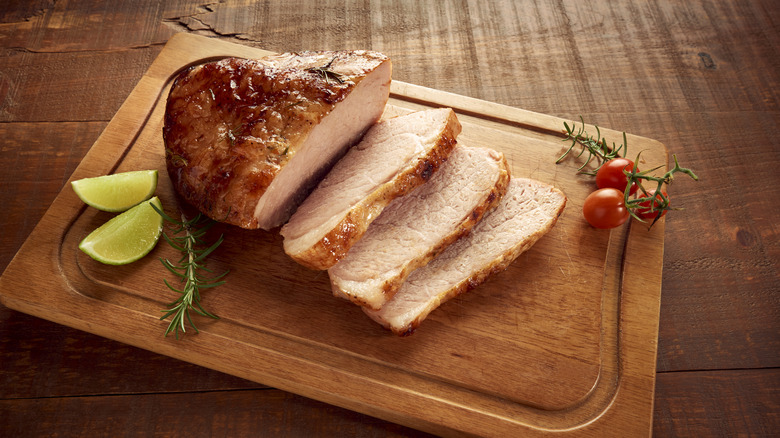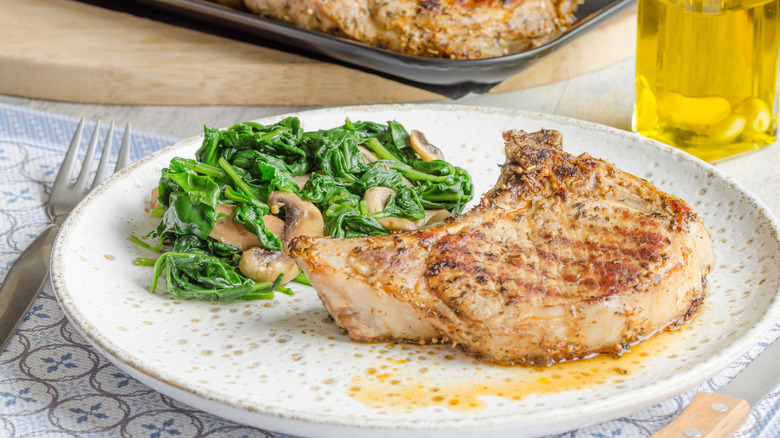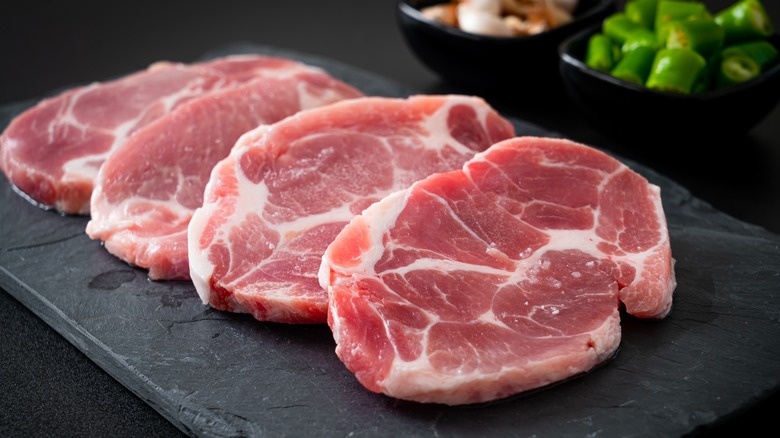Why You Should Skip Seasoning Pork Ahead Of Time
Ah, pork, the other white meat. Whether you're frying up some pork chops or eating a pulled pork sandwich, nothing beats digging into some juicy, tender, and flavorful swine. Although pork is incredibly versatile — capable of being grilled, baked, roasted, slow-cooked, and fried — it's also a type of meat that's easy to make, but hard to master.
Much like chicken breast or pot roast, a good pork relies not just on cooking technique, but the seasonings as well. Who wants to dig into a flavorless, bland pork roast after all? Fortunately, there's plenty of things you can add to pork to give it extra flavor, whether it's sweet, savory, or spicy. If you're in the mood for rich, melt-in-your-mouth pork, you could add a pork shoulder to a slow-cooker full of brown sugar, apples, and sauerkraut. If you have some pork chops, you can easily fry them up in a rub of molasses, sugar, and ginger. And if you grab some pork belly from your local butcher, you can marinade it to make some homemade bacon in your own kitchen.
In short, whether you want something smoky or spicy, pork of any shape and size is a good canvas to work on. But there's also a common mistake you may find yourself making: seasoning pork too far ahead of time. Why exactly should you skip what seems like an obvious step and save the seasoning for later? Keep reading to find out.
Seasoning too early can lead to drier pork
At first, seasoning well beforehand seems like such an obvious, common sense step — similar to how you might marinade a chicken before putting it on the grill. But the truth is that seasoning too early may result in pork that's less tender and much drier than you'd want.
Oliver Schwaner-Albright of Food & Wine conducted an experiment with two pork roasts, each cooked for the same amount of time and at the same temperature. The only difference, Schwaner-Albright explained, is that he salted and seasoned one pork roast the day before, and salted and seasoned the other pork roast immediately before putting it in the oven. While the pork roast that was seasoned before roasting was described as being moist and delicious, the roast seasoned the day before was noted as being incredibly dry and one of the most lackluster things Oliver and his team had eaten.
Oddly enough, other meats that Schwaner-Albright had used in his experiments, such as chicken and ribeye steaks, had very different outcomes than the pork roasts. The chicken that was seasoned the day before it was roasted was said to be more flavorful, while the ribeye steak that had been seasoned the day prior to cooking also had more flavorful fat and a tasty "aged" taste. How else, then, can you ensure you get a well-seasoned piece of pork without risking it drying out?
Use a marinade to help keep your pork moist
Now, not everyone has the luxury of being able to quickly prepare a pork dinner in one evening. It saves much more time, in some cases, to season the meat ahead of time and then cook it later. But, as we've learned, the same can't be said for pork.
A very simple solution is to soak your pork chops in a marinade overnight. By allowing the pork chops to rest in your choice of marinade until you're ready to cook them, you're not only allowing the meat to absorb the flavors of the marinade, but the liquid helps to keep it from drying out. It's also smart to remove them from their marinade about 30 minutes before you cook them. By bringing the meat up to room temperature, rather than just tossing those chops in the pan while still chilled, it will help ensure that moisture isn't lost while you cook it.
Although losing some moisture while cooking your pork is unavoidable, you can also add certain liquids, like stocks or gravy, in small doses to help keep the meat moist. It's also important to remember that, unlike a steak, pork is leaner and requires a bit more attention paid to the temperature. Don't try to flash-cook your pork — keep it at 145 degrees Fahrenheit at least to ensure a juicy and tender cut.


